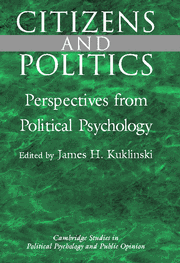Book contents
- Frontmatter
- Contents
- List of Contributors
- Prologue: Political Psychology and the Study of Citizens and Politics
- PART I AFFECT AND EMOTIONS
- PART II POLITICAL COGNITION
- PART III POLITICAL ATTITUDES AND PERCEPTIONS
- PART IV POLITICAL VALUES
- Introduction
- 13 Social Welfare Attitudes and the Humanitarian Sensibility
- 14 American Individualism Reconsidered
- 15 Political Value Judgments
- 16 Commentary: The Study of Values
- 17 Commentary: The Value of Politics
- Index
- Titles in the series
15 - Political Value Judgments
Published online by Cambridge University Press: 07 October 2011
- Frontmatter
- Contents
- List of Contributors
- Prologue: Political Psychology and the Study of Citizens and Politics
- PART I AFFECT AND EMOTIONS
- PART II POLITICAL COGNITION
- PART III POLITICAL ATTITUDES AND PERCEPTIONS
- PART IV POLITICAL VALUES
- Introduction
- 13 Social Welfare Attitudes and the Humanitarian Sensibility
- 14 American Individualism Reconsidered
- 15 Political Value Judgments
- 16 Commentary: The Study of Values
- 17 Commentary: The Value of Politics
- Index
- Titles in the series
Summary
Even the most casual observation of American politics reveals it to be the site of ever-present contests over what government ought to be doing and promoting. Some of these contests are about the best way to achieve consensually valued ends. Others are about the very purposes of government actions and policies themselves. Some engender bitter conflict and define political enemies. Others find people united behind a shared sense of purpose but divided about how exactly to proceed. Some engage material interests directly and concretely. Others do so only indirectly and indeterminately. My purpose in this chapter is to outline and illustrate an approach to studying public opinion that tries to illuminate this normative terrain.
This approach assumes that citizens evaluate public policies by bringing moral criteria to bear – in effect, asking questions like “Is this a good policy” or “What, in this case, is right?” Accordingly, one job facing public opinion analysts is to understand how citizens come to answer, and to disagree about, such questions. In their efforts to do so, I recommend that public opinion analysts think about political value judgments rather than about political values per se.
I first define and illustrate what I mean by political value judgments and develop two different ways of thinking about the kinds of considerations that underlie them. The focus here is on conceptual issues – on what political value judgments might consist of and how they might differ from one another.
- Type
- Chapter
- Information
- Citizens and PoliticsPerspectives from Political Psychology, pp. 433 - 468Publisher: Cambridge University PressPrint publication year: 2001
- 2
- Cited by

